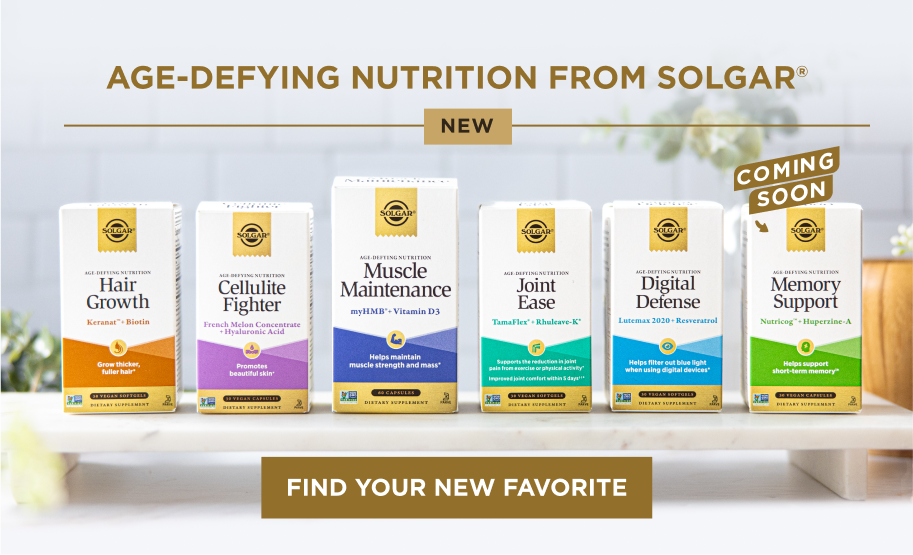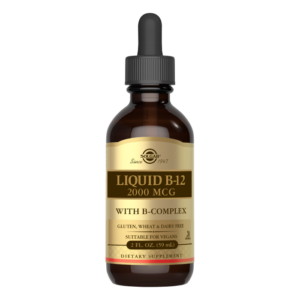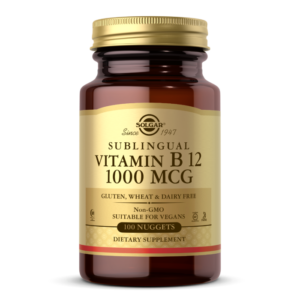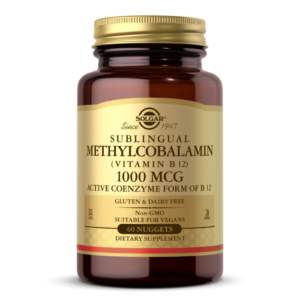Key Takeaways:
- Vitamin B12 helps keep nerve and blood cells healthy and is involved in DNA synthesis and renewal.* The body cannot make it on its own, so must get it from food or supplements.
- Although many animal foods contain vitamin B12, many people are still at a risk of being deficient. Taking a supplement is an easy way to get your daily dose of vitamin B12.
Have you ever stood in front of the supplement shelf at your local health food store, completely overwhelmed as to which vitamins you actually need? Believe us; we get it.
Here are tips for getting to know one of the small – but very important – vitamins: vitamin B12.
Vitamin B12 has become very popular in recent years, even being added to products like energy drinks. But what is vitamin B12? Where can you find it? And how do you know if you need more?
We’ve heard your questions and summarized the science so you can be more informed about this mighty little vitamin.
What is vitamin B12, and what does it do?
Vitamin B12 is a nutrient that helps keep the body’s nerve and blood cells healthy and is involved with DNA synthesis and renewal.* Like most vitamins, the body can’t make vitamin B12 on its own and must get it from food or supplements.1
Which foods contain vitamin B12?
Vitamin B12 is found in a wide variety of animal foods and is added to some fortified foods. Most plants – other than algae – do not have any vitamin B12 unless they are fortified with it. The best sources of vitamin B12 are beef liver and clams. Fish, meat, poultry, eggs, and other dairy products contain some vitamin B12 as well.2
Because most plants do not make vitamin B12, those who subscribe to a plant-based diet may need more vitamin B12 if they don’t eat grains that have been fortified with the vitamin or take a vitamin supplement.3
| Food | Micrograms (mcg) per serving |
Percent DV* |
|---|---|---|
| Liver, beef, cooked, 3 ounces | 70.7 | 2,946% |
| Trout, rainbow, wild, cooked, 3 ounces | 5.4 | 225% |
| Salmon, sockeye, cooked, 3 ounces | 4.8 | 200% |
| Tuna fish, light, canned in water, 3 ounces | 2.5 | 104% |
| Nutritional yeasts, fortified with 100% of the DV for vitamin B12, 1 serving | 2.4 | 100% |
| Haddock, cooked, 3 ounces | 1.8 | 75% |
| Beef, top sirloin, broiled, 3 ounces | 1.4 | 58% |
| Milk, low-fat, 1 cup | 1.2 | 50% |
| Yogurt, fruit, low-fat, 8 ounces | 1.1 | 46% |
| Cheese, Swiss, 1 ounce | 0.9 | 38% |
| Breakfast cereals, fortified with 25% of the DV for vitamin B12, 1 serving | 0.6 | 25% |
| Egg, whole, hard boiled, 1 large | 0.6 | 25% |
| Chicken, breast meat, roasted, 3 ounces | 0.3 | 13% |
Source: National Institute of Health
Our favorite vitamin B12 supplements
Vitamin B12 supplements are an easy way to ensure that you are getting the vitamin B12 you need.
Let’s take a look at a few of our favorites:
In an easy-to-take liquid formula, this B12 provides a great solution for anyone who has difficulty swallowing pills or capsules. The liquid formula is more convenient to use and offers 2000 mcg of vitamin B12, as well as seven other essential B-vitamins.
This formula supports energy metabolism and a healthy nervous system* and is 100% vegan, non-GMO, gluten-free, dairy-free, and kosher!
Solgar® Methylcobalamin (Vitamin B12)
Methylcobalamin is the active, coenzyme form of vitamin B12. While the body can readily absorb Vitamin B12 as cobalamin, it must further convert it to a coenzyme form, methylcobalamin, to become metabolically active. In this form, it is bioidentical to one of the two active forms found in the body. This body-ready vitamin B12 is suitable for vegans and comes in a convenient nugget-form.
GET THE LATEST UPDATES AND EXCLUSIVE DEALS WHEN YOU SIGN UP FOR OUR NEWSLETTER!
Summing it up
Although it is found in a variety of animal products, many people still may need more vitamin B12. Taking a vitamin B12 supplement if necessary can help make sure you aren’t missing out on this important vitamin.
For more quick tips on health and wellness, don’t forget to follow us on Instagram! (@solgar)
*These statements have not been evaluated by the Food and Drug Administration. These products are not intended to diagnose, treat, cure or prevent any disease.
The information provided on this site is intended for your general knowledge only and is not a substitute for professional medical advice or treatment for specific medical conditions. Always seek the advice of your physician or other qualified healthcare provider with any questions you may have regarding a medical condition. The information on this website is not intended to diagnose, treat, cure or prevent any disease. Never disregard medical advice or delay in seeking it because of something you have read on the Solgar® site.





